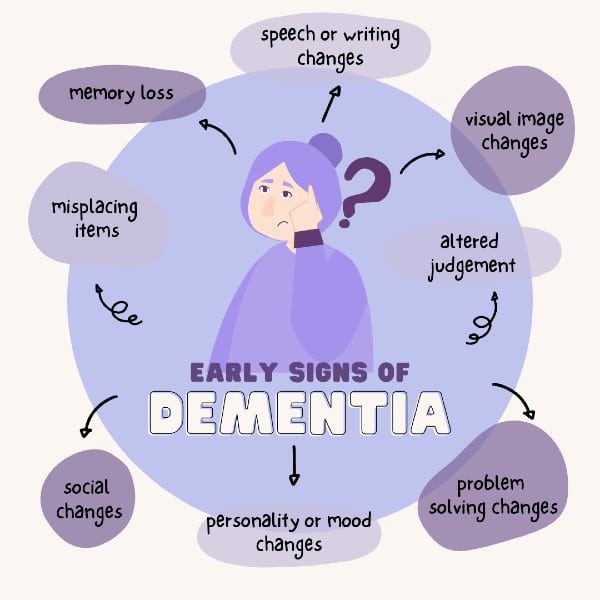Dementia, a group of conditions that affect memory, thinking, behaviour, and daily life management, is a challenging reality for both the individual and their loved ones. While there’s no cure, early detection of dementia is crucial. It empowers us to take proactive steps in finding the proper treatment and support, making a significant difference in the journey ahead.
What Causes Dementia?
Dementia occurs due to damage to brain cells, interfering with their ability to communicate. Various diseases and conditions can lead to this damage, with Alzheimer’s disease being the most common. Other causes include vascular dementia, Lewy body dementia, and frontotemporal dementia.
Early Warning Signs of Dementia and What to Look For
Recognizing potential dementia symptoms can be tough, as some changes might seem like normal aging. However, dementia goes beyond occasional forgetfulness. Below is a detailed look into common areas where early signs of dementia manifest:
Memory Loss Disrupting Daily Life
- Frequently forgetting recently learned information.
- Reliance on reminders or family for things typically handled independently.
- Repeating questions, conversations, or misplacing belongings.
Challenges in Planning or Solving Problems
- Difficulty following familiar processes like recipes or paying bills.
- Concentrating becomes more difficult, and tasks take significantly longer.
- Poor judgment or unusual changes in decision-making.
Confusion with Time or Place
- Losing track of dates, seasons, and the flow of time.
- Struggling to understand events unless they occur right then.
- Forgetting where they are or how they arrived at a location.
Difficulty with Everyday Tasks
- Difficulty with once-familiar activities, such as driving, using household items, or understanding the rules of a favourite game.
- These difficulties stem from cognitive impairments affecting memory, thinking, and problem-solving abilities.
Problems with Visual Understanding & Spatial Awareness
- Difficulty with reading, judging distance, or perceiving colours – potentially unsafe for driving.
- Having difficulty with fine motor skills.

New Challenges with Communication
- Struggling to find words in conversation or follow along.
- Using incorrect words to describe objects (e.g., “that thing for sitting” instead of “chair”).
- Repeating themselves frequently.
Misplacing Things and Inability to Retrace
- Placing items in unusual locations and being unable to find them.
- Accusations of theft may arise as memory loss progresses.
Poor Judgment or Decision-Making
- Neglecting personal grooming or wearing clothes unsuited to the weather.
- Uncharacteristic behaviour regarding money, like giving away significant sums or falling prey to scams.
Retreating from Social Life or Work
- Loss of interest in usual hobbies or social gatherings.
- Avoiding interactions due to difficulties they are experiencing.
Personality and Mood Swings
- Becoming easily confused, fearful, anxious, suspicious, or depressed.
- Unexpected emotional outbursts or rapid mood shifts.
Significant Concerns with Dementia
Early stages of dementia are not just about aging. While some memory issues occur with age, dementia’s impact is more significant.
The symptoms and their severity of dementia vary from person to person. It’s important to seek professional help rather than self-diagnosing. If you notice several of these signs in a loved one, a doctor’s evaluation is key. This professional guidance can provide reassurance and a clear path forward in managing the condition.
What Can You Do If You’re Concerned?
Talk to your Loved Ones
When discussing concerns about dementia with a loved one, it’s crucial to approach the conversation with empathy. Choosing a calm and private setting and using ‘I’ statements, such as, “I’ve noticed you’ve been forgetting appointments lately, and I’m concerned. Would you be open to seeing a doctor together?” can help express your concerns without causing defensiveness. This compassionate approach fosters understanding and a supportive environment.

Observe and Document Patterns
Keep a log of specific incidents (e.g., missed medications, repeated questions, or confusion with familiar tasks), including dates and frequency. Clear documentation helps doctors identify patterns and rule out other causes, such as vitamin deficiencies or medication side effects.
Provide Loving Support
Reassure them that their feelings are valid and that seeking help early can improve quality of life. Offer practical assistance, like organizing appointments or setting up reminders, while encouraging their independence where safe. Emotional support is key—listen without judgment.
A Proper Diagnosis is Essential
While a dementia diagnosis can be overwhelming, it opens doors to recognizing and understanding the early signs of dementia and brings clarity about the specific types of dementia.
When you are educated and informed of your treatment options, the medications and therapies available can manage symptoms and slow progression in some cases.
Receiving a proper diagnosis helps you plan for the future and be able to make informed decisions about care, finances, and support systems.

Dementia and In-Home Care
All types of dementia are progressive and affect memory, thinking, and behaviour. As the condition progresses, specialized care becomes increasingly essential. In-home care for individuals with dementia provides a personalized approach to support, enabling them to remain safely in the comfort of their own homes while receiving the necessary assistance.
This type of care can provide a familiar and less stressful environment, which can be beneficial for individuals with dementia.
Promyse Home Caregivers, trained in Dementia Care, focus on creating a safe, nurturing environment while assisting with daily activities such as personal grooming, medication management, and cognitive exercises designed to slow the disease’s progression.
Reach out to our Nurse Case Manager to discuss your care options for your loved one who may showing early signs of Dementia.



